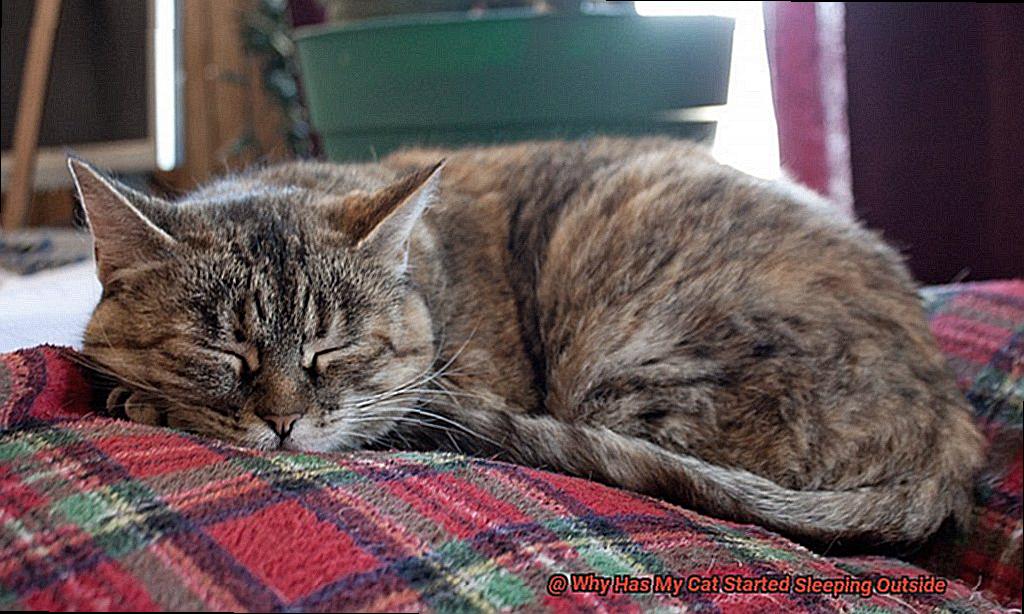Cats are no exception, and they’re known for finding the coziest spots in the house to catch some Z’s. But what happens when your feline friend starts sleeping outside?
It can be confusing and concerning, but fear not. Your cat’s behavior is likely due to their natural instincts or environmental factors.
Cats are incredibly adaptable creatures and can quickly adjust to new habits, including sleeping outside. This behavior may allow them to indulge in their hunting skills while still getting some shut-eye.
Plus, it’s a great way for them to explore the great outdoors. But what if there are other reasons why your cat has chosen to sleep outside?
Perhaps your household is feeling a bit overcrowded or unsafe for your furry friend. If you have other animals or new family members or visitors in the house, your cat may feel more secure and comfortable sleeping outside.
Whatever the reason may be, it’s essential to understand why your cat has started sleeping outside. In this blog post, we’ll delve deeper into these reasons and provide tips on how to keep your kitty happy and healthy under the stars.
So, grab a cup of tea (or catnip) and let’s explore this fascinating topic together.
Reasons Why Your Cat May Prefer to Sleep Outside
There are a few reasons why your feline friend might choose to spend the night under the stars.
Firstly, cats are natural hunters and explorers, so it’s no surprise that they love the great outdoors. Spending time outside can fulfill their natural instincts and provide them with endless opportunities to explore new territories, search for prey, and have some fun.
Another reason why your cat may prefer to sleep outside is because of temperature preferences. Cats have a higher body temperature than humans, so they may find it more comfortable to sleep outside in cooler temperatures.
Plus, their thick fur coats can regulate their body temperature, making them more adaptable to different weather conditions. Cats may also feel safer and more secure outside.
This could be due to territorial issues with other pets or feeling crowded inside the house. Providing a safe and comfortable outdoor sleeping area for your cat can help alleviate these concerns and give them a space to call their own.
However, it’s important to keep in mind that outdoor cats are at risk of injury or illness from other animals, vehicles, and exposure to extreme weather conditions. It’s crucial to weigh the risks and benefits before allowing your cat to sleep outside unsupervised.

Therefore, it’s always best to take your furry friend to the vet for a checkup if there are any sudden changes in their behavior.
Changes in Routine or Environment
Cats are fascinating creatures, known for their independence and love of routine.

However, sudden changes in their environment or daily schedule can cause them to feel anxious, leading to behaviors such as sleeping outside. As a pet owner, it’s crucial to understand the potential causes of this behavior and take steps to address them.
One of the most common reasons why cats start sleeping outside is due to changes in their routine. For instance, if you’ve started working longer hours or introduced a new pet or family member, your cat may feel lonely or bored and seek comfort outside.
Similarly, moving to a new home can cause anxiety and stress, prompting your feline friend to seek refuge outdoors. If you suspect that changes in routine or environment are causing your cat to sleep outside, it’s essential to identify the source of their stress and work towards resolving it.
Providing additional attention and affection, offering interactive toys and games, or creating a safe and comfortable space inside the house can all help alleviate your cat’s anxiety. It’s worth remembering that cats are creatures of habit and thrive on routine.
As responsible pet owners, you need to recognize the signs of stress in our feline friends and take appropriate steps to ensure their well-being.

Signs that Your Cat is Unwell or in Pain
One telltale sign that your cat may be unwell or in pain is changes in their sleeping patterns.
If you notice that your cat has started sleeping outside more often, it could be a warning sign. Here are some other signs to watch out for:
- Firstly, changes in appetite can be a major red flag. If your cat suddenly loses their appetite or drinks less water than usual, it may indicate an underlying health issue.
- Keep a close eye on their food and water intake, and if you notice any significant changes, don’t hesitate to seek veterinary attention. Lethargy is another warning sign to look out for.
- If your cat appears more tired than usual or lacks energy, it could point to pain or illness. They may also sleep more frequently than normal or show less interest in playing or exploring.
- Cats are notorious for their grooming habits, so if you notice a sudden change in their grooming routine, it could be a sign of discomfort. Your cat may stop grooming themselves or have an unkempt coat appearance.
- They may even over-groom certain areas, resulting in bald patches or skin irritation. Changes in litter box habits can also indicate that something isn’t right.
- If your cat starts avoiding their litter box or has difficulty urinating, it could be a sign of a urinary tract infection or other health condition. Keep an eye on their bathroom habits and seek professional help if necessary.
- Lastly, pay attention to any unusual vocalizations from your cat. If they start meowing excessively or making strange sounds, it could be an indication that they are in pain or discomfort.
They may also become more vocal when doing things that they don’t like, such as being picked up or petted. Remember that cats are experts at masking their pain, so it’s critical to pay attention to their behavior and seek medical attention when appropriate.
If you notice any of these signs in your cat, please take them to the vet as soon as possible for a check-up.
Tips for Keeping Your Cat Safe Outdoors
Whether they’re playing, lounging, or sleeping outside, it’s crucial to take proactive measures to protect them from potential dangers. Here are six tips for keeping your cat safe outdoors.
Provide a Secure Outdoor Space
Cats love to roam and play outside, but it’s essential to provide them with a secure and enclosed outdoor space. Consider building a cat enclosure or a screened-in porch where your cat can enjoy the sights, smells, and sounds of the outdoors without facing any harm.

Proper Identification
Cats can easily get lost outside, so it’s crucial to make sure they have proper identification. Microchipping and collar identification tags will ensure that your cat is returned to you if they wander too far.
Cozy Outdoor Shelter
If you want your cat to sleep outside, ensure they have a cozy and secure shelter to sleep in. It could be as simple as a cardboard box lined with blankets or an outdoor cat house elevated off the ground to avoid moisture and predators.
Designate a Safe Outdoor Area
Cats need space to roam, but it’s crucial to keep them within a safe zone. Fencing in a designated outdoor area will allow your cat to explore while remaining protected from potential dangers.
Vaccinations and Flea/Tick Prevention
Outdoor cats are more susceptible to picking up parasites and diseases from other animals, so make sure your cat is up-to-date on their vaccinations and flea/tick prevention.
Monitor Your Cat’s Behavior
Lastly, monitor your cat’s behavior closely when they are outside. If you notice any signs of distress or discomfort, bring them back inside. Additionally, check on your cat regularly and make sure they are not in any danger.
Keeping your cat safe outdoors should be a top priority for any cat owner.
By providing a secure outdoor space, proper identification, a cozy outdoor shelter, a designated safe area, vaccinations/flea prevention, and monitoring behavior closely, you can ensure that your furry friend enjoys the great outdoors while remaining protected from potential dangers.
How to Encourage Your Cat to Sleep Inside Again
If you’ve noticed that your cat has been spending more time outside and less time snuggled up with you indoors, don’t worry. There are several things you can do to encourage your furry friend to come back inside and enjoy the comfort of your home. Here are some tips to help your cat sleep inside again.
Create a Cozy Sleeping Space
Just like humans, cats need a comfortable and cozy place to sleep. Make sure your feline friend has a soft bed or a warm spot near a window, so they can cuddle up and feel secure. A cozy sleeping space will help your cat feel comfortable and safe, making them more likely to want to sleep inside.
Adjust the Temperature
Cats are natural at regulating their body temperature, so if your home is too warm or stuffy, they may prefer the cooler temperatures outside. To make it more convenient for your cats, consider adjusting the thermostat or providing a fan for their sleeping area. This will ensure that they stay comfortable while sleeping inside.
Remove Scent Markings
If your cat is marking their territory outside, it’s important to clean and remove any scent markings from around the outside of your home. This can be done with enzymatic cleaners specifically designed for pet odors. By removing the scent markings, your cat will not feel compelled to go outside and mark their territory again.
Provide Mental and Physical Stimulation
Cats are playful creatures that need regular mental and physical stimulation to keep them entertained and happy indoors. Provide your furry friend with interactive toys, scratching posts, and regular playtime. This will help them get the exercise they need and make them more likely to want to sleep inside at night.
Be Patient and Consistent
Encouraging your cat to sleep inside again requires patience and consistency. Avoid punishing or scolding them for sleeping outside and instead focus on positive reinforcement when they choose to sleep indoors. With time and effort, your cat will hopefully start to feel more comfortable and secure sleeping inside once again.
So, every cat is unique, and finding what works best for your feline companion will take some trial and error. You can encourage your cat to sleep inside by creating a cozy sleeping space, adjusting the temperature, removing scent markings, providing mental and physical stimulation, and being patient and consistent.
Also Read: Why Does Your Cat Wait Outside Your Bedroom Door?
Conclusion
In conclusion, if you find your feline friend snoozing outside, don’t worry.
Cats are adaptable creatures that enjoy the great outdoors for various reasons. It could be to satisfy their hunting instincts, explore new territories, feel more secure outside.
However, it’s crucial to understand why your cat has chosen to sleep outside and take proactive measures to ensure their safety. To create a cozy and safe outdoor space, make sure your cat has proper identification tags and flea prevention.
Additionally, observe their behavior when they’re outside and seek out a secure outdoor area for them to explore. On the other hand, if you want to encourage your cat to sleep inside again, provide them with a comfortable sleeping space that offers both mental and physical stimulation while being patient and consistent.
Remember that changes in your cat’s behavior may also indicate underlying health problems or pain. Therefore, it’s essential to get them checked by a veterinarian if necessary.







